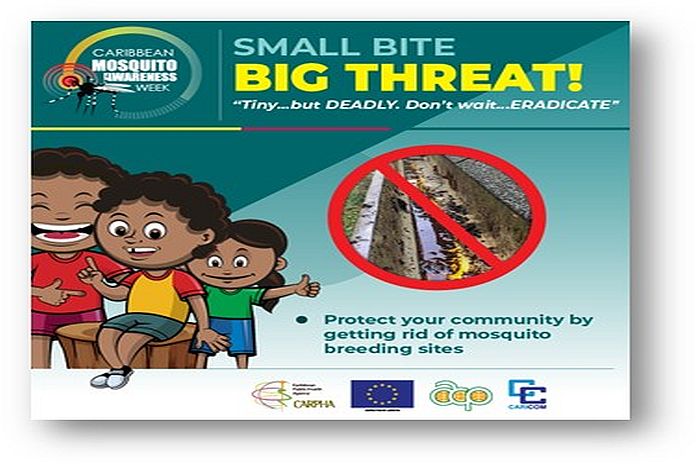PORT OF SPAIN, Trinidad – The world has been engaged in battling the novel coronavirus COVID-19 since it was declared a pandemic on March 10, 2020. The new normal has seen many nations continuing to integrate social distancing, wearing facial masks and hygiene measures into everyday life. Some countries still maintain closed borders and restrict population movement in efforts to limit the spread of COVID-19. These measures allow health systems to maintain readiness in order to manage the pandemic and other important public health threats that can emerge at short notice.
During the last quarter of 2020, several CARPHA Member States reported localised outbreaks of Dengue, a mosquito-borne disease, which placed an even greater burden on national health systems already engaged in managing the pandemic. “Moving forward to 2021, we must all play our part in the prevention and control of mosquito-borne diseases in order to maintain our health and well-being, especially during the COVID-19 pandemic” stated CARPHA executive director, Dr Joy St John, in observance of Caribbean Mosquito Awareness Week 2021.
“The Aedes aegypti mosquito is a major vector, which spreads diseases such as Dengue, Chikungunya and Zika. These diseases can be a significant cause of illness and even death, impacting countries negatively on an economic and social level”, said Dr Laura-Lee Boodram, head of vector-borne diseases at CARPHA. She further added, “The introduction of Chikungunya and Zika in 2014 and 2016, respectively into the Caribbean region, together with the presence of competent vectors such as Aedes aegpyti, means that constant vigilance must be maintained.
The potential for outbreaks to occur and the introduction of new mosquito-borne diseases in the Caribbean region is an ever-present threat. CARPHA works in conjunction with Member States and various international development partners on strategies to prevent and control mosquito-borne diseases in the region.
Caribbean Mosquito Awareness week (CMAW) was declared in November 2014 at the 17th Special Meeting of the CARICOM heads of government on public health threats. CMAW is held annually in May and is an important reminder to the general public to take action to reduce their risk of diseases spread by mosquitoes.
In 2021, CARPHA’s CMAW slogan states, “Tiny…but DEADLY. Don’t wait…ERADICATE!”, placing emphasis on measures to control mosquito breeding. As the rainy season approaches, water can accumulate in the base of plants pots, vases, buckets and used vehicles tires, which are typical breeding sites. An increase in vector populations will further the risk of disease transmission.
Rajesh Ragoo, senior technical officer, vector- borne diseases, CARPHA recommends, “the best way to “fight the bite” around homes and communities, is to ensure that our surroundings are clean and free of materials or containers that can accumulate water. Water storage drums and tanks should also be properly covered and inspected periodically to ensure that there is no breeding.” He further indicated, “It is also important to minimize individual exposure to mosquito bites. Vulnerable groups such as infants, young children, older adults and women who are pregnant or trying to get pregnant are at greater risk. Personal protective measures including the wearing of long-sleeved clothing and the use of insect repellents are strongly recommended.
In late 2019, CARPHA entered into a grant agreement with the European Union (EU), which supports regional prevention and control efforts against mosquito-borne diseases. The focus will be placed on strengthening Member State disease surveillance systems and vector control operations, expanding community engagement, public health education and increasing partnerships and collaborations to reduce the morbidity and mortality associated with mosquito-borne diseases.
CARPHA recommends that greater efforts be placed on mosquito awareness in communities, and vector control activities should be intensified. CARPHA has developed Mission Mosquito, an innovative information toolkit, which includes animated videos, posters and answers to frequently asked questions (FAQs). The toolkit is specially packaged to meet the needs of a diverse audience, which include public health professionals and clinicians, pregnant women, and children.
The toolkit is available here http://missionmosquito.carpha.org/. Communication material developed for CMAW 2021 is available here.





